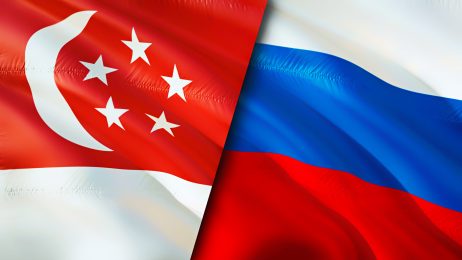by Alessia Donzello / April 14, 2022
ASEAN member states have given varying responses to the ongoing invasion of Ukraine, which mostly depends on their relationship with – and dependence on – Russia.
In February, ASEAN foreign ministers issued an official statement on the crisis. The 10 representatives said they are deeply concerned with the ongoing invasion, but they avoided directly criticizing Russia.
The statement calls on “all parties concerned to exercise maximum restraint, to pursue dialogue through all channels, including diplomatic means to prevent the situation from further escalation and to seek peaceful resolution in accordance with international law and the United Nations Charter.”
In March, ASEAN issued another statement calling for an immediate ceasefire. But again, the statement was vague and cautious.

The only ASEAN member imposing sanctions on Russia is Singapore.
The country also plans to impose trade restrictions on materials that could be used as weapons to harm Ukrainians. Experts say that one of the reasons why Singapore has chosen to go against Russia is that as a small country, it wants its voice to be heard and its sovereignty to be respected in the global arena.
Gilang Kembara, a researcher with the Centre for Strategic and International Studies in Jakarta, said Indonesia does not want to be against Russia because “domestic opinion indicates that any support given towards Ukraine would indicate Indonesia’s willingness to ‘follow the Western narrative,’ or to be ‘pro-West.’ Such [a] position has so far been quite unpopular with the public, which has led to increasing support of Russia, predominantly in social media”.

Zachary Abuza of the National War College in Washington, D.C. said in a statement that most ASEAN nations do not appear “willing to punish Russia for their illegal war of aggression,” but the length of the war and the “degree of devastation” against civilian populations will likely factor into future diplomatic relations.
The justification that Putin has employed for his action is a nationalistic interpretation of Ukraine as a fake nation and an integral part of historic Russia. Moreover, he has described Ukraine as a threat and Russia could not feel “safe, develop and exist”. “Whoever tries to interfere with us, and even more so, to create threats for our country, for our people, should know that Russia’s response will be immediate and will lead you to such consequences that you have never experienced in your history,” he added.
However, his justifications have been considered unacceptable by almost every superpower in the world and his invasion has prompted a debate about what US involvement should look like.
NATO and the EU have made perfectly clear that they won’t engage directly with Russian forces because being involved at a rather high level could lead to a war in Europe.
However, the situation could change quickly if Moscow’s attack on Kyiv spreads into a NATO member nation. Article 5 states that an attack on one member of NATO is an attack on all members.
Because of the invasion, the EU and NATO have shown they are more united than ever. In recent weeks, Sweden and Finland have reportedly considered joining NATO due to Putin’s recent threats to the Nordic countries.

“Everything changed when Russia invaded Ukraine,” Finnish Prime Minister Sanna Marin said, speaking alongside her Swedish counterpart, Magdalena Andersson, at a joint news conference in Stockholm.
Marin has declared “there is no other way to have security guarantees than under NATO’s deterrence and common defense as guaranteed by NATO’s Article 5.”
After Easter celebrations, Sweden and Finland will finally announce their decision on whether or not they will join NATO.
